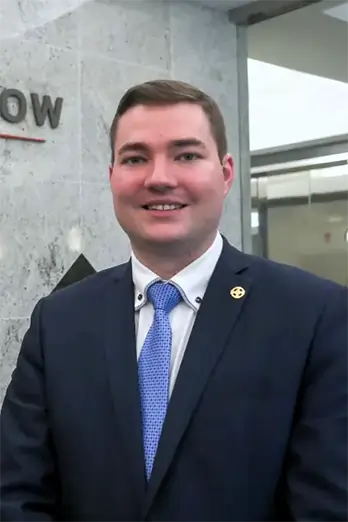Diminished value refers to the reduction in a vehicle’s market value after it has been involved in an accident, even after repairs.
At Blaszkow Legal, PLLC, our knowledgeable personal injury attorneys understand how important it is to recover compensation for losses, including those related to diminished value.
Determining the extent of diminished value can be challenging, but a structured approach can help you secure appropriate compensation under Virginia law. First, we’ll provide a basic overview of the concept.
An Introduction to Diminished Value
Diminished value arises when a vehicle, though repaired, is no longer worth as much as it was before the accident. Buyers often view a repaired vehicle as less desirable due to things like hidden damage.
In Virginia, the concept is especially relevant in cases where the at-fault party’s insurance must compensate you. The three primary types include:
- Immediate diminished value: The reduction in market value immediately after the accident but before repairs are completed. This type often reflects the immediate hesitation of potential buyers to purchase a damaged vehicle.
- Inherent diminished value: The loss in value that remains even after quality repairs are performed. This is the most commonly claimed type in Virginia, as it accounts for the stigma attached to vehicles that have been involved in accidents.
- Repair-related diminished value: The decrease in value due to substandard repairs or incomplete restoration of the vehicle. This can occur when repairs fail to fully restore the vehicle’s appearance or function, making the damage more apparent to future buyers.
As we look at the calculation process, understanding how these types affect your claim is critical.
Factors Influencing Diminished Value
Several factors play a role in determining diminished value in Virginia. These include the vehicle’s age, mileage, pre-accident condition, and the extent of the damage. Additionally, the quality of the repairs performed and the vehicle’s resale market can significantly impact its diminished value.
Insurance adjusters often rely on specific formulas or appraisers to determine how much the accident has affected the vehicle’s value. However, these methods may not always align with what is fair.
Adjusters might use the “17c formula,” a controversial approach that caps the loss at 10% of the car’s pre-accident value. The location of the accident can also influence the calculation of diminished value, as market trends and demand for specific vehicles vary across different regions in Virginia.
For instance, a luxury vehicle in Northern Virginia’s metropolitan areas may experience a higher perceived loss in value compared to a similar vehicle in rural areas, where buyers may be less concerned about cosmetic or structural repairs.
Understanding local market dynamics can provide valuable insight when estimating how much value your car has lost. Having a professional appraiser evaluate the vehicle is often helpful to challenge lowball estimates. It’s essential to prepare for how these evaluations unfold when filing a diminished value claim.
Calculating Diminished Value in Virginia
The calculation typically begins with determining the car’s pre-accident value, which can be obtained through resources like Kelley Blue Book or National Automobile Dealers Association (NADA) guides. From there, factors such as the severity of damage and the car’s age are considered. One common formula involves these steps:
- Start with the car’s pre-accident value: This value reflects what your car was worth immediately before the accident occurred. It can be determined using reliable resources like Kelley Blue Book or NADA guides, factoring in the vehicle’s make, model, year, and any upgrades that contribute to its value.
- Apply a damage multiplier based on the severity of the accident: The damage multiplier is a percentage that estimates how much the damage has affected the car’s overall value. Minor cosmetic damage might use a lower multiplier, while structural damage or frame repairs may use a higher one.
- Adjust the total based on mileage and condition factors: High mileage or poor pre-accident condition can reduce the vehicle’s value, while better conditions may offset some of the loss. This step means the final diminished value accurately reflects how these variables influence the car’s marketability.
While formulas provide a baseline, they often understate the actual loss. This is why working with an experienced attorney and appraiser can be beneficial. Next, we’ll walk through how to handle insurance companies, which is a key part of filing a claim.
Filing a Diminished Value Claim
In Virginia, diminished value claims are typically filed with the at-fault party’s insurance company. Your claim should include documentation supporting your car’s reduced market value. This often requires a professional appraisal, repair invoices, and detailed photographs of the damage.
Filing a claim also involves negotiating with the insurance company, which may try to minimize your payout by using their preferred valuation methods, like the 17c formula. This formula often underestimates diminished value by capping losses at unrealistic levels.
To counter such tactics, you can provide an independent appraisal or hire legal counsel familiar with Virginia’s property damage laws. Establishing a well-documented case with clear evidence helps reinforce your position and increases the likelihood of recovering a fair amount.
Clear communication with the insurer is essential, but these claims are often met with resistance. Insurance companies may argue that the vehicle’s value hasn’t been significantly affected or that their valuation methods are sufficient.
Legal representation can help challenge these tactics by presenting stronger evidence of the vehicle’s loss in value. Understanding what to expect during the claims process helps pave the way for discussing common concerns among clients.
Common Questions About Diminished Value
Some of the most frequently asked questions we encounter regarding diminished value claims include:
- Can I file a diminished value claim if I was partially at fault?
Virginia follows a contributory negligence rule, meaning you may not recover damages if you’re found even slightly at fault. This strict standard makes it essential to establish that the other party is entirely responsible for the accident. - How long do I have to file a diminished value claim?
Virginia’s statute of limitations for property damage claims is five years from the date of the accident. Filing promptly allows sufficient time to gather evidence and address disputes with the at-fault party’s insurer. - Can I claim diminished value if I repaired my car?
Yes, inherent diminished value claims often apply even after complete repairs. This type of claim recognizes that a repaired vehicle still carries a stigma in the resale market, reducing its perceived worth. - Does my insurance cover diminished value?
Your policy might not, but the at-fault driver’s insurance typically handles these claims. Reviewing your policy terms and the at-fault party’s coverage can clarify the available options for seeking compensation. - How do I prove diminished value?
Professional appraisal and repair records are crucial for substantiating your claim. Providing before-and-after photos of the vehicle and detailed documentation of the damage can further strengthen your case.
These questions highlight the importance of being informed before proceeding with a claim.
Secure Legal Support for Diminished Value Claims
We strive to offer guidance tailored to your needs, helping you present a strong case to insurance companies. Whether you’re in Fairfax, Arlington, Woodbridge, or Manassas, we’re here to serve you. We understand the challenges of pursuing full compensation. To learn more about how our firm can assist, contact Blaszkow Legal, PLLC today.





